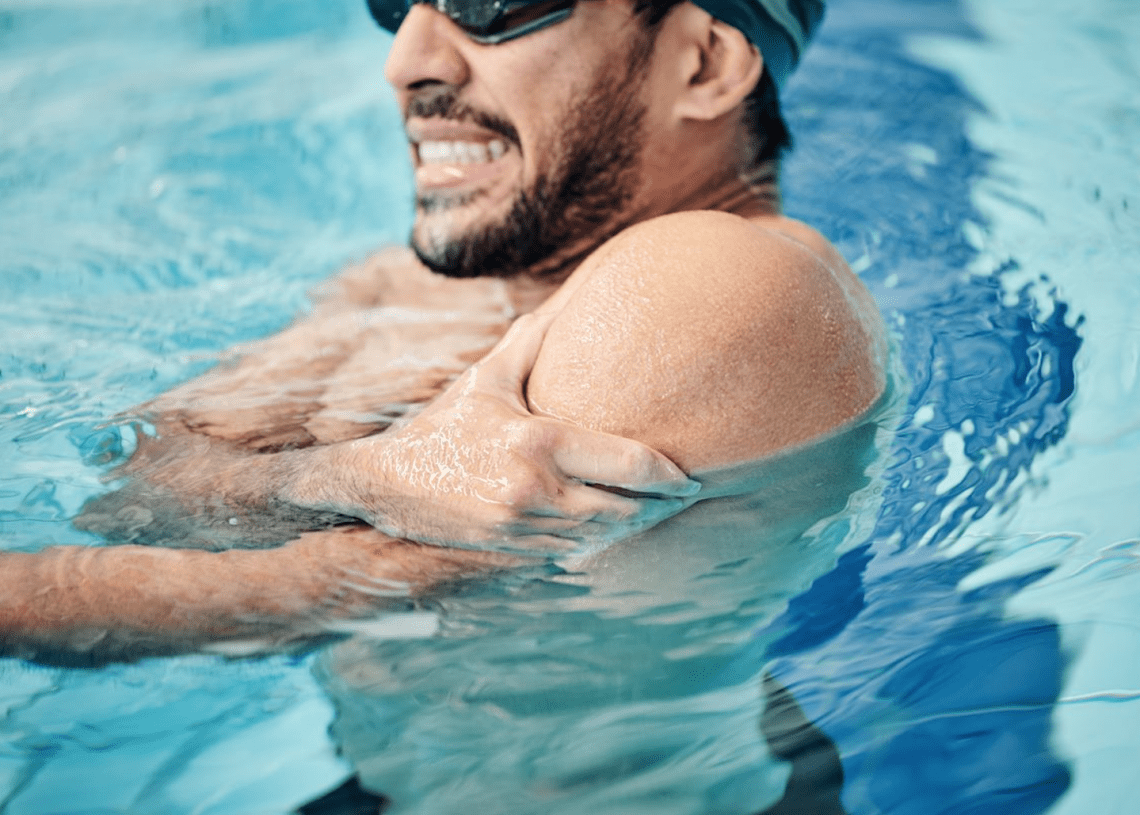
How to keep your shoulders healthy
Swimming specialist physiotherapist Alex Ewart looks at what works and what doesn’t for preventing shoulder injury
Up to 91% of swimmers experience shoulder pain in their lifetime according to one study. Given the prevalence of shoulder pain among swimmers, when a swimmer experiences discomfort in their shoulder, it is commonly referred to as ‘swimmer’s shoulder’.
Swimmer’s shoulder is extremely frustrating as it can have a major impact on your swimming and may reduce the enjoyment of one of your favourite activities or stop you swimming
completely. As a physiotherapist who specialises in the treatment of swimmers, I frequently see this frustration.
Unfortunately, many swimmers adopt injury prevention routines to ensure that their shoulders stay healthy, only to find themselves having shoulder pain again. There is a lot of information out there on swimmer’s shoulder and prevention but it is not all supported by the latest research. So what really does help?
Does stretching actually help?
Many of the swimmers I work with are surprised by one thing… the lack of stretching in our programmes. After all, many of these swimmers have been told that stretching can be helpful in preventing injuries. But do swimmers really need to stretch?
There are two main reasons swimmers may not need a lot of stretching in their injury prevention routines. First, most swimmers already possess adequate shoulder mobility for swimming. Therefore, additional stretching may not yield significant benefits.
In fact, many swimmers are hypermobile, meaning they are more flexible than average. For
hypermobile swimmers, caution must be exercised with stretching as it could potentially increase the risk of instability.
Second, a feeling of tightness in a muscle is often a sign of weakness rather than actual tightness. Stretching alone can perpetuate this feeling without addressing the underlying weakness. Instead, the solution lies in implementing a targeted strengthening programme.
The power of strength training
Numerous research studies have shown that stretching alone does not prevent injuries in various sports and does not significantly improve performance.
Conversely, other studies have shown the importance of strength training in injury prevention and performance. By engaging in a structured strengthening routine, swimmers can not only come back from injuries but also prevent them from occurring in the first place.
By strengthening the muscles around the shoulder, you increase the shoulder’s capacity to handle stress. This means your shoulders won’t fatigue as quickly, decreasing the risk of injury.
While stretching may still be beneficial for certain areas that tend to tighten up in swimmers, it is not a one-size-fits-all solution. Most swimmers I have worked with have found better results with a focused strengthening routine tailored to their specific needs.
My Top 4 Shoulder Exercises
Here are four great exercises that I recommend for swimmers to keep your shoulders healthy.
Face Pulls
Reps: 3 sets of 12-15 repetitions
Push Up Plus
Reps: 3 sets of 8-10 repetitions
Three Way Banded Pull Apart
Reps: 2 sets of 8 repetitions, each rep has three movements.
Bear Hugs
Reps: 3 sets of 12-15 reps
Other effective ways to prevent Swimmer’s Shoulder
In addition to having a strength training routine, there are three risk factors that can have a significant influence on your risk of injury. You can have the best injury prevention routine in the world, but if you don’t pay attention to these factors, your injury prevention routine won’t do anything.
Avoid Acute Training Spikes
One of the most common causes of swimming injuries are sudden and significant increases in swimming volume. This can overwhelm the muscles around the shoulder, leading to fatigue, inflammation, and ultimately, shoulder injuries. This is especially common when the weather gets warmer and your rapidly increase your outdoor swimming distances or after a long break from swimming. It is important to gradually increase your training to allow your body to adapt and recover adequately.
Proper Nutrition
Taking care of your body’s nutritional needs is essential for optimal performance and injury prevention. Be sure you are consuming an appropriate amount of carbohydrates and maintaining a balanced diet that provides all the necessary nutrients to support your swimming.
Sufficient Sleep
Adequate sleep is often underestimated but plays a crucial role in injury prevention. Research has consistently shown that getting at least seven to eight hours of sleep per night significantly decreases the risk of injuries.
Restful sleep will improve your body’s ability to recover from your workouts. Getting more than seven hours of sleep a night is one of the best things you can do for your body.
Swimmer’s shoulder is a common problem for swimmers, but it doesn’t have to hinder your progress or dampen your love for swimming. By understanding what you can do to prevent swimmer’s shoulder as outlined above, you can significantly reduce the risk of a swimmer’s shoulder and keep swimming strong and injury-free.
Alex Ewart is a strength coach and physical therapist. Find out more at theswimmingpt.com








